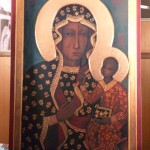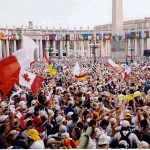![Graffiti showing Pope John Paul II with quote "Do not be afraid" in Rijeka, Croatia - by Roberta F. (Grafiti_rijeka_1208.jpg) [CC BY-SA 3.0 (https://creativecommons.org/licenses/by-sa/3.0/deed.en) and Croatian Copyright And Related Rights Act of 2003, article 91, paragraph 1)], via Wikimedia Commons](https://wp-media.patheos.com/blogs/sites/721/2016/07/Grafiti_rijeka_1208-957x1024.jpg)
In 2014, I had originally thought that I’d be wrapping up my research on the long involvement of Christians in Hong Kong’s democracy movement since the 1970s, which has included Latin Catholics from since the beginning through the episcopacies of Francis Hsu, John Baptist Cardinal Wu, Joseph Cardinal Zen, and John Cardinal Tong. I had in fact interviewed Cardinal Zen twice in 2012 (by this time, he was retired), so when I saw that he was involved in the escalating events leading to the Umbrella Movement, I wrote about him and his practice of Catholic social teaching in Hong Kong, which then turned into a talk that I gave at the Catholic Newman Center at the University of Washington, then a series of posts on Ethika Politka on Chinese Catholicism with Artur Rosman, and then a book review where I severely criticized a highly regarded book on Sino-Vatican relations for basically throwing the Church under the ideological bus. I was also involved in some solidarity work with the Umbrella Movement in Vancouver, and because of this, I met the Eastern Jesuit (a Chinese Canadian) who eventually chrismated me, receiving me into full communion with the Bishop of Rome.
But the thing about Hong Kong Catholicism is that Catholicism is never really ever just about one place. There’s a sense of universality about the whole thing, and it probably has something to do with being in communion with the Bishop of Rome. What’s interesting, as Rosman likes to point out, is that it could quite possibly be because of this universality that there’s a contemporary link between Catholicism and social solidarity instead of what he calls an ‘altar and throne’ arrangement. In my own Ukrainian Greco-Catholic Church, Fr Peter Galadza echoes:
In any case, more Orthodox need to understand the reasons that so many Eastern Catholics remain Catholic. In part, at least, it relates to some of the unresolved issues that continue to generate division within Orthodoxy. Eastern Catholics have found them resolved as a result of union with Rome – imperfect as that union has been. Jurisdictional strife, for example, is essentially absent from Eastern Catholicism. Also, the ethno-phyletism that plagues parts of Orthodoxy is challenged by communion with a universal primate. Of course, Eastern Catholics can be just as guilty of the same ethno-phyletism (though, ironically, its proponents within Eastern Catholicism insist that they simply want a “national Church” – “just like the Orthodox”). However, as culpable as Eastern Catholics may be of this ecclesiological heresy, they nonetheless recognize the right of the Bishop of Rome to reprove and/or discipline Catholic leaders who would foment or tolerate nationalist hatred. And while the Pope’s admonitions may not always be heard, no one in the Catholic Church questions his right to exercise universal primacy in this way. These problems are not adduced here to point to “Orthodox failings.” They are only mentioned to illustrate why even those Eastern Catholics who passionately love Orthodoxy remain Catholic.
In other words, researching Hong Kong Catholicism meant that I had to get to know Catholicism, period, because something that happened in one place always had ramifications somewhere else. When I gave my Hong Kong talk at the Newman, for example, a Polish Catholic priest in attendance raised some very interesting parallels between Cardinal Zen and the politics of Cardinals Wyszyński and Wojytła in Poland in literal Solidarity with the people – even before Solidarność was a thing (in fact, Zen invokes these connections himself). So too, when the Eastern Jesuit organized a prayer rally in Vancouver in solidarity with the Hong Kong protests, his (and now my) Ukrainian Catholic bishop not only gave him his blessing, but asked him to draft a litany petition on the Umbrella Movement to be prayed in all our parishes ‘because,’ he said (and the Jesuit has given me permission to quote this), ‘of course, we can’t be just about Ukraine.’ Ukraine, of course, was no small potato geopolitically at this time (or even now, for that matter): the parallels between Euromaidan and the Umbrella Movement are uncanny and deserve further exploration.
My thinking about Francis was refined in this crucible. First, I came to understand in a very personal way how not all critiques of Francis and his curia are levelled by American neoconservatives who don’t like Francis’s politics of deprivatization. As both Cardinal Zen and Fr Andriy Chirvosky point out in the respective cases of Chinese Catholicism and Ukraine, using ‘mercy’ to dress up Ostpolitik toward both Xi Jinping’s China and Putin’s Russia is alarming indeed, not least because it throws real, living, breathing Catholic persons under the bus.
But second, I’ve also come to appreciate how critique is not necessarily the language of schism, but an exhortation for the Bishop of Rome to be true to his own critique of ‘the piecemeal third world war,’ a term that he learned in Korea and used again recently in an interview en route to World Youth Day to describe the killing of the French priest by Daesh sympathizers. As my Patriarch Sviatoslav said of Francis right after he had signed the Havana Document that threw Eastern Catholics under the bus by reducing them to ‘ecclesial communities’ (paragraph 25) while also denying that Russia had in fact invaded Ukraine (certainly this is part of the piecemeal third world war) (paragraph 26):
We need to remember that our unity and full communion with the Holy Father, the Successor of the Apostle Peter, is not the result of political agreement or diplomatic compromise, or the clarity of a Joint Declaration text. This unity and communion with the Peter of today is a matter of our faith. It is to him, Pope Francis, and to each of us today, that Christ says in the Gospel of Luke: “Simon, Simon, behold, Satan demanded to have you, that he might sift you like wheat, but I have prayed for you that your faith may not fail. And when you have turned again, strengthen your brothers.” (emphasis mine)
So too, I wrote on Artur Rosman’s blog recently that Zen is calling for quite the opposite of schism when he critiques Francis; he is calling for Francis to stand up to the third world war wherever it is taking place, even if it is China. Perhaps it takes an Eastern Catholic to say this (or not, as Zen bears witness), but critiquing the Bishop of Rome is not necessarily schismatic. These Chinese and Eastern Catholic nudges to Francis are in fact catholicity at their finest.












